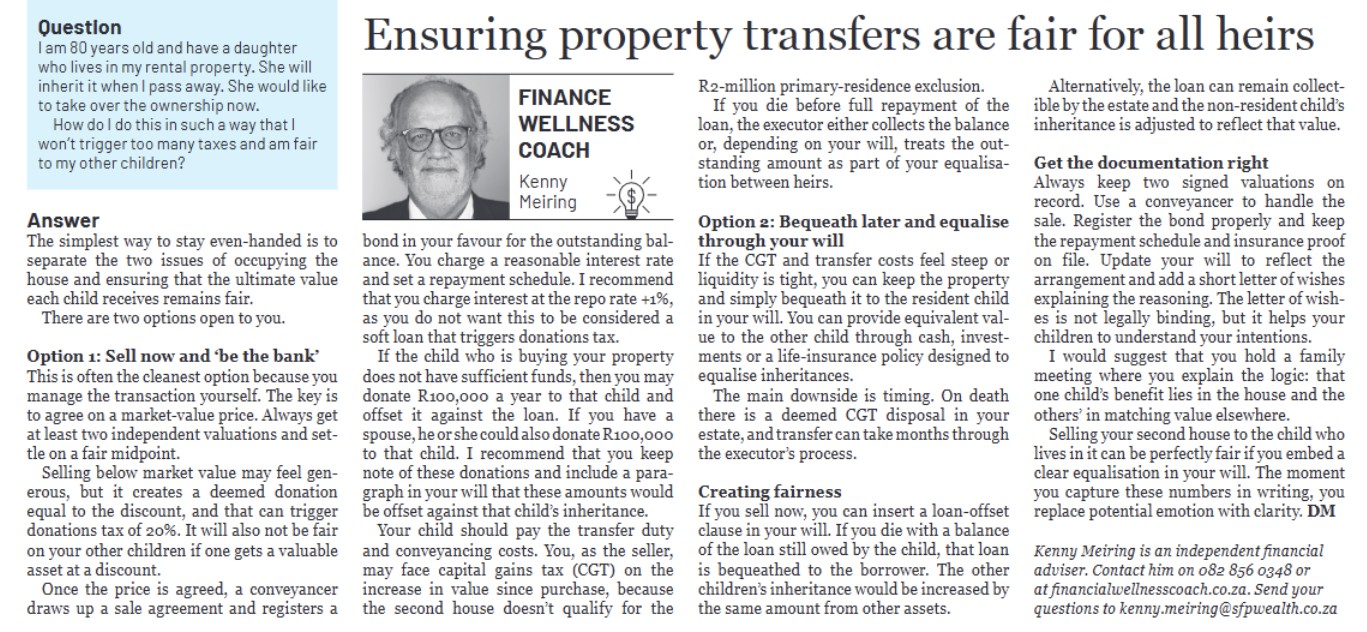No. 227 – Ensuring property transfers are fair for all heirs
Question
I am 80 years old and have a daughter who lives in my rental property. She will inherit it when I pass away. She would like to take over the ownership now.
How do I do this in such a way that I won’t trigger too many taxes and am fair to my other children?
Answer
When one child lives in a family asset, emotions can cloud arithmetic. The simplest way to stay even-handed is to separate the two issues of occupying the house and ensuring that the ultimate value each child receives remains fair.
There are a couple of options open to you
Option 1 – Sell now and “be the bank”
This is often the cleanest option because you manage the transaction yourself while alive. The key is to agree on a market-value price. Always obtain at least two independent valuations and settle on a fair midpoint. Selling below market value may feel generous, but it creates a deemed donation equal to the discount — and that can trigger donations tax of 20%. This will also not be fair on your other children if one gets a valuable asset at a discount.
Once the price is agreed, a conveyancer draws up a normal sale agreement and registers a bond in your favour for the outstanding balance. You charge a reasonable interest rate and set a clear repayment schedule. I recommend that you charge interest at the repo rate +1% as you do not want this to be considered a soft loan and trigger donations tax.
If the child who is buying your property does not have sufficient funds, then you may donate R100,000 a year to that child and offset it against the loan. If you have a spouse, he or she could also donate R100,000 to that child. In order to be fair to the other children, I would recommend that you keep note of these donations and include a paragraph in your will that these amounts would be offset against that child’s inheritance.
Your child should pay the transfer duty and conveyancing costs, as with any purchase. You, as seller, may face capital gains tax (CGT) on the increase in value since purchase, because the second house doesn’t qualify for the R2 million primary-residence exclusion.
The loan you hold will be an asset in your estate. If you die before full repayment, the executor either collects the balance or, depending on your will, treats the outstanding amount as part of your equalisation between heirs.
This route works well because everything is transparent. The resident child gains ownership now and the other children will have their share of the estate adjusted to ensure fairness.
Option 2 – Bequeath later and equalise through your wills
If the CGT and transfer costs feel steep, or if liquidity is tight, you can keep the property and simply bequeath it to the resident child in your will.
You can provide equivalent value to the other child through cash, investments, or a life-insurance policy designed to equalise inheritances.
The main downside is timing. On death there is a deemed CGT disposal in your estate, and transfer can take months through the executor’s process. The sale-now option brings speed and certainty; the inherit-later approach postpones tax and cost but leaves the process slower and more dependent on future valuations.
Creating fairness
Whether you transfer now or later, the fairness hinges on how you equalise value. If you sell now, you can insert a loan-offset clause in your wills. If you die with a balance of the loan still owed by the child, that loan is bequeathed to the borrower. The other children’s inheritance would be increased by the same amount from other assets.
Alternatively, the loan can remain collectible by the estate, and the non-resident child’s inheritance is adjusted to reflect that value.
Get the documentation right
A well-intentioned family plan can unravel if the documentation is sloppy. Always keep two signed valuations on record. Use a conveyancer to handle the sale. Register the bond properly and keep the repayment schedule and insurance proof on file. Update your will to reflect the arrangement and add a short letter of wishes explaining the reasoning. The letter of wishes is not legally binding, but it helps your children understand your intentions.
I would suggest that you hold a family meeting where you explain the logic: that one child’s benefit lies in the house and the others in matching value elsewhere. Families rarely fight about the maths; they fight about surprises. Transparency now prevents resentment later.
Selling your second house to the child who lives in it can be perfectly fair if you embed a clear equalisation in your wills. The moment you capture these numbers in writing; you replace potential emotion with clarity.
KENNY MEIRING IS AN INDEPENDENT FINANCIAL ADVISER
Contact him via phone, email or via contact phone on the financialwellnesscoach.co.za website

Read more of our articles on the Daily Maverick website or newspaper weekly!

